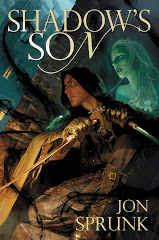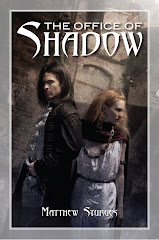A lean figure, wrapped in a long cape, stood atop a slender footbridge spanning Gelshania Boulevard. It was an hour before dawnshift. High above the boulevard, attached to the baroque, ornate panels of the concave ceiling, bronze-and-platinum glowclusters shone dimly, as if sleeping. Down below, the boulevard’s floor was of polished butter-yellow metal. At this hour, only a few servitors walked there, carrying out their errands.
I was once like you.
Tom Corcorigan was a Lord, and there were people in power who knew the part he had played in the War Against The Blight; but nothing could eradicate the memory of his lowly childhood and the deprivations of his years in servitude.
Beneath the cape, his missing left arm ached.
There was movement, far along the shrinking perspective of the boulevard tunnel. Tom recognized the vanguard immediately for what it was: a cohort of greystone warriors, neither human nor living statues but somehow both, their slit-eyes covered with nictitating membrane and impervious to sporemist or smartwraith, their bodies formed of granite and morphstone, tensing to unbelievable hardness in the heat of battle.
Expensive, Tom thought. Who is it that can afford their services?
This was the Primum Stratum of Demesne Kalshuna, an old rich realm that had suffered during the war. What reason could the Liege Lord’s clan-members have for sneaking around before dawnshift? As far as Tom knew, he and Elva—she was fast asleep in their guest apartment—were the only visiting nobility.
The procession drew closer.
Oh, Fate ...
Behind the greystone phalanx, a levanquin floated, moving ponderously above the metallic yellow floor. Eerie blue reflections slid across its bubble-covered carapace; inside, a bulky, shaven-headed figure was barely visible. Behind the levanquin, more greystone warriors walked, and among them shuffled twin rows of manacled servitors, dressed alike in shabby blue livery.
Haven’t I tried enough to eradicate this?
The vehicle’s occupant was an Oracle, and these servitors could surely bear witness to the intense, perverse stimulation that most Oracles required to bring their strange, fragmented mentalities into a semblance of coherence, to match their thoughts to normal timeflow.
Like every Oracle, this one would be a product of the Collegium Perpetuum Delphinorum. The nearest Collegium (for there were three sites in the world) had survived enemy occupation during the War Against The Blight . . . and it was Tom’s and Elva’s destination. This was the eighth night (or early morning) of their honeymoon; their peregrination would end at a place which took innocent children, with their families’ consent, and turned them into monsters.
And one of those abominations occupied the levanquin sliding at this moment beneath the footbridge.
I could kill you now.
A drop onto the bubble-canopy, a swift cut from the graserbracelet he wore—a wedding present from Elva—and Tom would be inside. Then his bare hand would be enough to dispense justice on behalf of those who suffered so that Oracles might thrive.
Whether Tom could escape from an enraged cohort of greystone warriors was another matter . . . but he knew already that he was not going to try. He had no intention of making a widow of Elva so soon.
Elva ...
A soft smile alighted on Tom’s face, and he turned away from the sights below, pulling up his cape’s hood, and strode on across the footbridge, heading back towards his and Elva’s temporary home.
Tom walked the length of the apartment’s hallway. Its floor was square-patterned, milky violet quartz and hard transparent glass, beneath which lambent orange lava flowed. Just for a moment, he caught a glimpse of hexagonal flukes as a thermidor wriggled and swam through blazing hot magma.
A doorshimmer evaporated, and he stepped through into the darkened lounge. An oval window overlooked the Benbow Cavern, containing a scene of joyful debris. Down below, torn banners floated in ornate pools; discarded flagons decorated quiescent fountains which last night had flung polarized streamers of thousand-hued water in high, triumphant arcs. There were a few sleeping bodies; on one tilted lev-bench, a Lord-Meilleur-sans-Demesne lay sprawled against a commoner.
Mesodrones were scooping up the litter.
Sooner or later the victory celebrations would have to cease, and everyone would turn to rebuilding their lives. For now, why not? The Blight had been a vast malignant lifeform, enslaving millions of minds as it reached throughout the realms of Nulapeiron, and they had been lucky to beat it back and destroy it. They had caused it to confront an entity which lived in mu-space, a possibly god-like being that had once been human, whose name was Dart. It was the Dart-entity which had defeated the Blight.
So why aren’t I happy?
But Tom knew that the Blight had been a spawned seedling, and that during the final battle it had been trying to contact its parent organism: the vast worlds-spanning hiveform known as the Anomaly. That Anomaly had already subsumed entire planets. Even in Nulapeiron, where the teaching of history was tightly controlled, the Anomaly was a dark legend synonymous with fear.
And the closer Tom and Elva drew to the Collegium Perpetuum Delphinorum, the less Tom was able to sleep. During nightshift, he kept snapping awake, convinced that the Anomaly was already aware of Nulapeiron’s existence. If it had any curiosity concerning a world capable of killing its offspring, it might turn its attention here . . . and Tom was under no illusion that the trick they had pulled off against the Blight could be made to work again.
The Blight had nearly destroyed Nulapeiron. How humanity might fight the vast malignant entity which had spawned the Blight, Tom had no idea.
A crystal sideboard stood against one wall of the elegant chamber. On the sideboard, atop a platinum tray, was an oval outline in shadow. Tom assumed that Eemur’s severed head was asleep, or in some state that might pass for sleep; but then her words sounded directly in his mind:
Can’t sleep, my Lord? Did something come up?
Tom stared into the gloom.
Or fail to? Shame, on your honeymoon.
Thank you, Eemur, for your kind empathy.
Tom could not have said exactly when he became aware of the link between them. It had occurred during the past few days, growing continuously stronger, and he was already taking it for granted. He had not mentioned it to anybody else . . . not even Elva.
You’re worried about the Anomaly.
Of course I am. Aren’t you?
Tom made a control gesture, and a glowglobe detached itself from the ceiling, flickering brightly as it floated lower.
Naturally. But no-one else will be in the mood to listen, and you know that.
But the danger—
Is based on what? Your intuition? My Sight? You know what they’re worth.
Fate damn it.
Now the light glistened on Eemur’s flensed and disembodied head: her blood-wet striated muscles, including the odd three-way strips beneath grey-white cheekbones; her long exposed teeth; the bulging spheres of her eyes. There was something new: a black moirée cap covering the remnants of scalp and sparse, sticky strands of lank, blood-soaked hair.
You know I’m right.
Her head balanced on its tangle of sinews and severed arteries, testament to the clumsy beheading five centuries before.
You know I don’t have to like it. But, yes . . . You’re right.
So what are you going to do?
Down in the Benbow Cavern, the glowclusters were beginning to shine a rosy hue, marking the commencement of dawnshift.
I’m going to work out. Is that all right with you?
Whatever you say. Don’t mind me.
Then the contact between them became muted, a kind of mental hush falling in the chamber. Tom nodded, and gestured to the glow-globe to return to the ceiling. As it rose, he shucked off his cape and tunic. Bare-chested, wearing only dark training tights, he stood relaxed, taking in deep breaths.
No comment came from Eemur’s Head.
Tom worked through his warm-up routine, then his squats and one-arm press-ups (the only kind, as he sometimes remarked to Elva, that he would ever be able to do). Then he ordered the morph-capable ceiling to extrude a loop, for a series of one-finger pull-ups (each finger in turn): a traditional exercise used only by élite-class climbers.
The first part of his workout was over. Tom gestured a section of flooring into laminar-flow mode, stepped onto it and began to run. After a few minutes, he pushed up the speed, and the flow accelerated to match.
His bare torso was slick with sweat.
Anomaly.
Running.
I will not let you do it.
Running harder.
I will not let you take my world.
Tom ran on his hurtling journey to nowhere, faster and faster on the spot, concentration narrowing until he was pure movement, all fears and thoughts forgotten.
When his training was finished and his breathing had slowed, Tom stood in the bedchamber doorway, still soaked with sweat, scratching the stump which depended from his left shoulder.
“Remove an arm.” Lady Darinia’s words echoed across the years. “Either arm will do.”
On the bed, his beautiful wife Elva lay sprawled and contented. The chamber’s glowglobe painted her skin dawnshift-pink, full of promise.
Then she stirred and opened one eye.
“Well, my good Lord. I hope you haven’t exhausted yourself.”
“I am pretty tired.”
“How tired, sir?”
The smartsatin sheet furled back.
“Not very,” Tom said.
“Then come here.”
Resolution © John Meaney





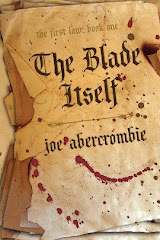.jpg)




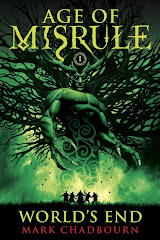.jpg)










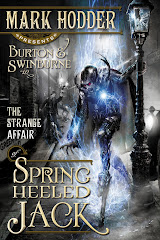


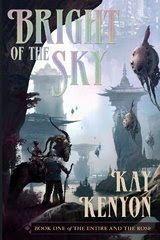.jpeg)
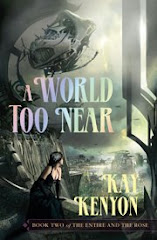.jpg)











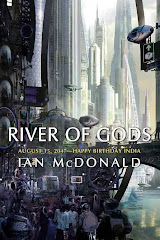.jpg)














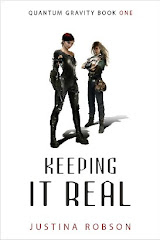.jpg)



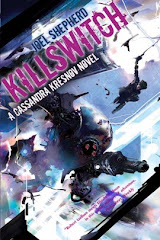.jpg)




